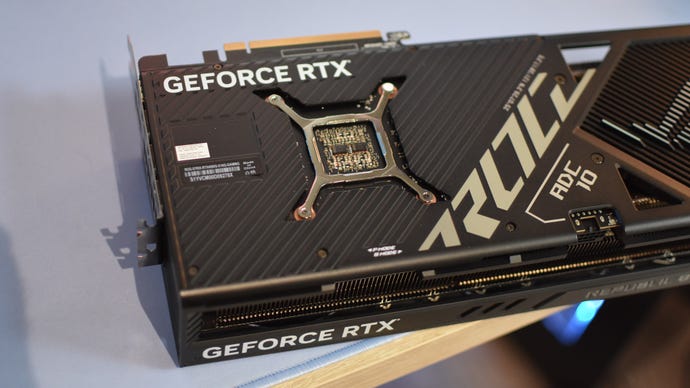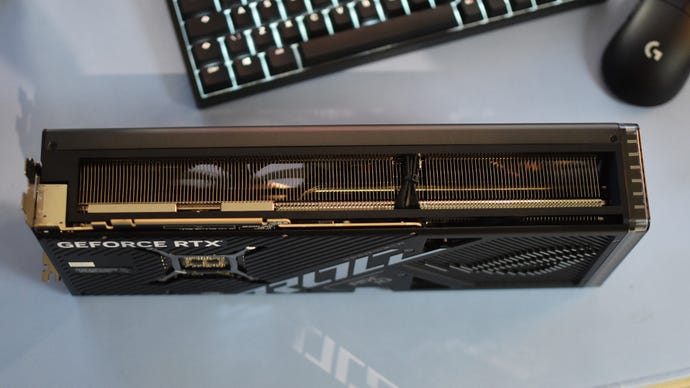Nvidia GeForce RTX 4080 Super review: new price, familiar performance
This refreshed GPU is better value than the RTX 4080, though not always faster
If the RTX 4070 Super was all about addressing its predecessor’s so-so performance gains, the RTX 4080 Super’s course correction is more deeply rooted in issues of cold, hard coinage. For better and worse, it turns out – while this Super-fied GPU knocks hundreds off the RTX 4080’s starting price, any excitement for a potential new 4K champion is quickly muted by it barely moving the dial on straight FPS output. If, indeed, it’s not somehow running slower.
That such a possibility even exists is bizarre, as the RTX 4080 Super makes similar upgrades to those that gave the RTX 4070 Super such a leg-up. Maybe the increase in CUDA cores is smaller (up from 9728 on the original 4080 to 10240 here), but there are still base and boost clock speed improvements, while the 16GB of VRAM widens its bandwidth from 717GB/s to 736GB/s. Get yourself a factory-overclocked model, like the (deep breath) Asus ROG Strix GeForce RTX 4080 Super OC Edition I have here, and you’re looking at more enhancements still. This particular card ups the boost clock to 2670MHz in OC mode, beyond the reference RTX 4080 Super’s 2550MHz and the RTX 4080’s 2510MHz.
Such third-party customisations will cost more, obviously. But you should be able to grab this newfangled GPU from £959 / $999, an entry point that – while high – serves to make the £1269 / $1199 RTX 4080 look like even worse of a deal than it did back in 2022. And since, what with drops below £1000 proving painfully sparse outside of big Black Friday-style sales.

Better specs for less money? I can dig that. I think we all can, except those who bought a 4080 just before the new Supers were announced. It's just that for all its promising-sounding tweaks, the RTX 4080 Super doesn’t deliver the performance uplift that its suffix suggests.
Nvidia GeForce RTX 4080 Super review: 4K benchmarks
In fairness, Nvidia’s latest does claim the occasional 4K win. It even caught up to the otherwise dominant RTX 4090 in Forza Horizon 5, Assassin’s Creed Valhalla, and Watch Dogs Legion, and regularly bests the Radeon RX 7900 XTX – AMD’s top-of-the-line gaming card – without any help from the usual GeForce trump card, DLSS. At the same time, those three games are also the only ones in which it shows a clear upgrade over the RTX 4080.
In half of these benchmarks, the older GPU actually manages to run so evenly against the Super model that you won’t tell the difference, or it scores a couple of frames higher. That might be margin of error territory but it’s still a disappointment, especially after the RTX 4070 Super so clearly stepped up from its own non-Super counterpart.
Speaking of, the 4070 Super’s barnstorming application of DLSS upscaling and DLSS 3 frame generation made me wonder if Nvidia boffins had found a way to make the Super versions even better at leveraging their AI-based tools. Sadly, it looks more like that was just an exceptional showing on that single GPU’s part. In a ray-traced Cyberpunk 2077, the RTX 4080 Super is only barely faster than its (much cheaper) stablemate, while the original RTX 4080 outpaces it when frame gen is in play.
How weird, given that this is not meant as a 'budget' RTX 4080 but as an overall hardware upgrade. There are other glimpses of the RTX 4080 Super properly fulfilling this brief: in Watch Dogs Legion with both Ultra ray tracing and DLSS on Quality, its 67fps average was a marked improvement on the RTX 4080’s 60fps. Horizon Zero Dawn also rose to 129fps with the addition of Quality DLSS, whereas the RTX 4080 could only scale up to 135fps.
These victories are rare, mind, leaving most of my DLSS and/or ray tracing results with the RTX 4080 Super only coughing up one or two extra frames per second over the older model.
Nvidia GeForce RTX 4080 Super review: 1440p benchmarks
At least it’s still powerful enough to show signs of CPU bottlenecking at lower resolutions. In short, the RTX 4080 Super looks a bit like overkill at this rez, especially when the RTX 4070 Super provides a compelling option with all the same DLSS 3 and Ray Reconstruction support.
That said, there are – as there were at 4K – moments of glory. In Forza Horizon 5, the RTX 4080 Super somehow managed to punch through the 112fps-ish wall that most of its alternatives simply bounce off, and it’s the best of the bunch in Horizon Zero Dawn, Metro Exodus, and AssCreed Valhalla. Hitman 3/World of Assassination as well, if only just.
As you’d expect, the RTX 4080 Super also beats the 4070 Super where hardcore ray tracing is involved. In Metro Exodus, with no upscaling but Ultra-quality RT effects, this GPU scored 106fps to the 4070 Super’s 82fps, enough of a gap that you can see the smoothness difference on a high-refresh-rate monitor. There was also a degree of redemption for that 4K Cyberpunk 2077 performance: now at 1440p and with a full set of Psycho-level ray tracing settings, Quality DLSS, and frame generation, the RTX 4080 Super comfortably won with 134fps to the 4070 Super’s 106fps.
Still, let’s not pat the former’s back too much when the latter is nearly half the price. And more power-efficient. And more likely to actually fit in your PC case, because the circuit board isn’t the size of a Nimitz-class aircraft carrier. There’s potentially an argument for deploying the RTX 4080 Super in a 1440p rig if you’re utterly dead set on maxed-out, 165Hz, fully ray-traced luxury, but ultimately it makes much more sense as a fast 4K card.

Is it a fast 4K card you should buy, though? I will say that as little of a dial-mover that the RTX 4080 Super is on performance, it is a better graphics card than the RTX 4080. On average, it’s slightly faster, and even if the two performed exactly the same, the Super version’s lower price would break the tie anyway. If you want high-high-hiiiiiigh-end game settings and the RTX 4090 remains out of reach, then in a purely numerical sense: yes, this is the next best thing.
All the same, you should think very carefully whether it’s worth investing in over the other premium-leaning Super cards that Nvidia has just wheeled out. The RTX 4070 Super is good at all resolutions, and although I haven’t got my hands on an RTX 4070 Ti Super yet, it could – assuming any measurable improvement on the RTX 4070 Ti – be a real contender for 4K. The RTX 4080 Super might be a toe-twitch in the right direction, but it still isn't the RTX 3080-style superstar that this generation of Nvidia GPUs has been missing.









